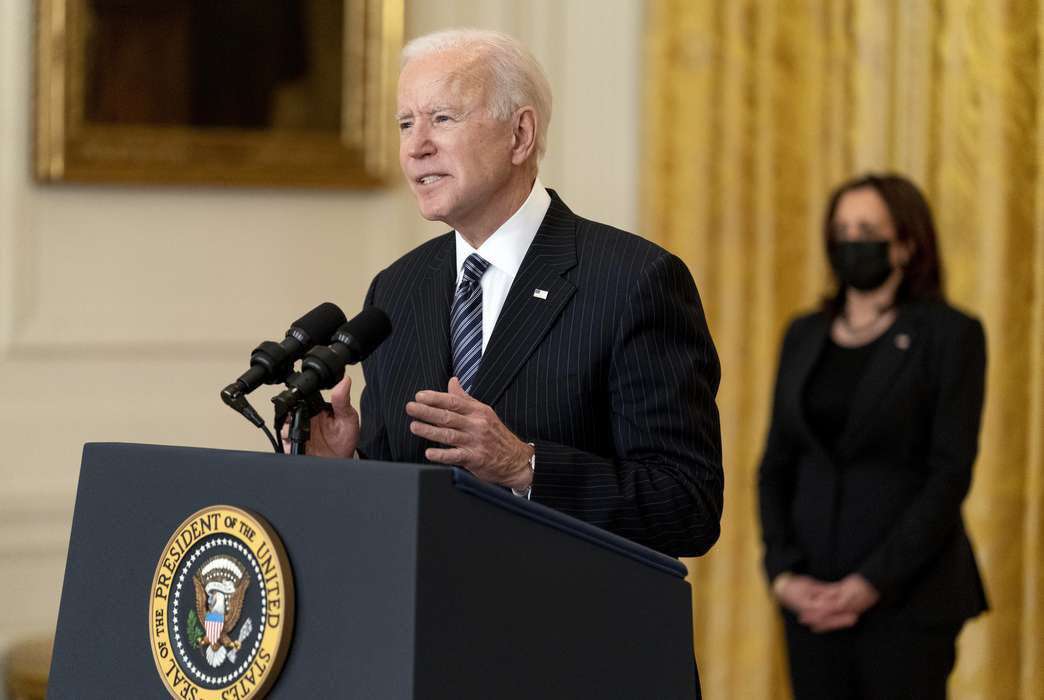Donald Trump's election and decision to remove the U.S. from the Paris Agreement both paradoxically led to significantly lower share prices for oil and gas companies, according to new research in a leading financial journal, while Joe Biden's presidency has so far been great for fossil fuel stocks.
Integrated oil and gas companies saw 14.8% lower-than-expected returns around the election of Donald Trump in November 2016 and a 5.5% drop around his formal announcement in June 2017 that the U.S. would exit the Paris climate accord, according to a new paper published in the International Review of Financial Analysis.
The counterintuitive result came despite Trump's pledges to embrace fossil fuels and criticism of green energy, leading researchers to conclude that, "The Paris Agreement trumped Trump."
"We got this result and we thought, 'Oh wow there must be something wrong.' We triple, quadruple checked everything," said lead author Ivan Diaz-Rainey, finance professor and head of the Climate and Energy Finance Group at the University of Otago in New Zealand. "Anything that maybe links the oil and gas sector to climate change, even though it's positive news, might just remind investors that long term, these stocks are going to have a negative effect."
Diaz-Rainey wrote the paper alongside his University of Otago colleagues Sebastian Gehricke, Helen Roberts and Renzhu Zhang. The researchers used a portfolio event study, controlling for factors like oil prices and general market volatility that could have also affected oil and gas shares.
While the New Zealand researchers only examined events through 2017, their counterintuitive findings contrast with recent market events under U.S. President Joe Biden, who has rejoined the Paris Agreement and taken a more assertive tone toward fighting climate change than Trump.
Yet despite Biden's pledges, the early days of his presidency have so far been great for fossil fuel shares. The exchange-traded fund XLE, which tracks the global oil and gas market, has gained about 37% so far in 2021, compared to less than 5% for the S&P 500 more broadly.
Diaz-Rainey said that Biden being less friendly to domestic oil and gas production may actually help multinational fossil fuel companies like Exxon and Chevron that have operations around the world, leading to their shares' higher performance. And the depths of the coronavirus-era sell-off in oil and gas shares means that investors who may be skeptical of the industry's long-term viability can still be attracted to bargain-bin prices.
"When these things get sold so heavily, eventually they start to become attractive from a value perspective," Diaz-Rainey said. "They were just so oversold."
The researchers offered two possible explanations for why fossil fuel stock prices fell under Trump despite his moves to support the industry. First, Trump's push to increase domestic oil and gas production may have primarily benefited U.S. fracking companies, many of which are privately owned and therefore not reflected in the stock market. Second, a group of U.S. states representing about half of the country's population and a majority of its GDP pledged to adhere to the agreement's goals, potentially decreasing the effect of Trump's withdrawal.
In addition to examining the Trump presidency, Diaz-Rainey and his colleagues also examined two Obama-era events that impacted oil and gas companies: the signing of the Paris Agreement in December 2015, and the ratification of the agreement by the U.S. and China in September 2016.
Unsurprisingly, these events were also bad for the oil and gas sector. The signing of the Paris Agreement led to 8.4% lower-than-expected returns for oil and gas firms, and shares of exploration and drilling companies in particular fell even more. The ratification of the treaty by the U.S. and China also had a marginally negative impact.
The Otago researchers were not the first to evaluate the effects of the Paris accord and Trump's election on oil and gas stocks. In a 2018 paper, Samson Mukanjari and Thomas Sterner of the University of Gothenburg evaluated the returns of oil and gas ETFs around each event, concluding that each event only had "moderate effects" on oil and gas share prices.
ETFs are typically designed to mimic the performance of an overall market sector or index, maintaining proportional holdings of companies based on their size. Therefore, an oil and gas ETF would contain far more shares of diversified giants like Shell and BP than smaller companies — and, therefore, the University of Gothenburg primarily reflected the performance of large companies.
By contrast, the Otago researchers gave equal weight to small and large firms.
"The integrated oil companies, the Exxons, are global by nature and had been under a lot of pressure around this stuff," said Diaz-Rainey. "By having equally weighted portfolios we had a greater sense of what happened to the smaller players."
"The impact of Paris is much greater than we've realized," he added.
The paper, "Trump vs. Paris: The impact of climate policy on U.S. listed oil and gas firm returns and volatility," published in the International Review of Financial Analysis on March 13, was authored by Ivan Diaz-Rainey, Sebastian Gehricke, Helen Roberts and Renzhu Zhang, the University of Otago.

Joe392rr on March 22nd, 2021 at 07:30 UTC »
Thanks goodness prices are over now $4.00+ per gallon. I was getting sick of paying for cheap gasoline over the last four years.
true4blue on March 22nd, 2021 at 05:35 UTC »
Correlation isn’t causation
That the oil companies share prices dropped wasn’t caused by Trump getting elected
It did coincide with a massive boom in shale production and a Saudi oil price war, which flooded the market and drove down the oil majors profits, and depressed their stock prices
These studies are garbage
bobonabuffalo on March 22nd, 2021 at 04:08 UTC »
Probably cause demand for oil is decreasing and probably won't increase unless the president ordered everyone to burn a barrel of crude in their backyard everynight. Renewables are becoming competitive in a way that is cheaper and easier than fossil fuels.